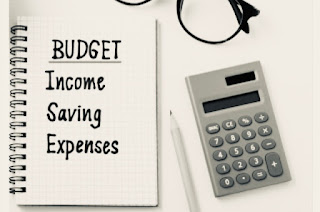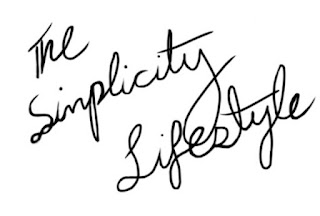Simply Getting Things Done
-Simplicity is the Key
Simplicity is extremely important to living a good life because the universe is super complicated. I would even say infinitely complex.
Organizing our lives in the simplest way possible makes it so we don’t become lost in the complexity.
Minimalism is a way to simplicity.
As Minimalists We ask Ourselves what is truly necessary to live a good life.
A roof over Our heads, clean water to drink, healthy food to eat, basic utilities, and some kind of transportation are all necessary, at this time in my life, for me and my family to be comfortable.
This may look different for different people.
There has been times in my life that these “necessities” were different for me. When I was a young man, before joining the military, I was completely content to live in a van, of course that Lifestyle wouldn’t be acceptable now because I’m disabled, married, and have a child.
Even though we have to provide a certain level of comfort we have still learned to be Minimalists.
“The question of what you want to own is actually the question of how you want to live your life.”
- “The Life-Changing Magic of Tidying Up” by Marie Kondo
When all the unnecessary clutter is gone from Our lives it’s easier to see what is truly important. It’s easier to get our lives under control, which will free our attention making it possible to pursue what we want to pursue!
-Note Taking, journaling, and using a planner so important things don’t fall through the cracks
When I was younger I never did any of these things.
I never took notes in school. I never journaled my daily thoughts and feelings or my nightly dreams. I never used a planner. I didn’t have to do these things because I was blessed with an incredible memory.
I used to be able to easily remember pretty much anything. I would memorize a whole Shakespeare play over the weekend just for fun or a hundred digits of pi for a little extra credit in my AP Calculus class.
I thought I would have this amazing gift for my whole life, but slowly through the years my memory got worse and worse.
Now because of my chronic pain, medications, and sleep issues I’m lucky to remember a basic synopsis of what happened yesterday.
As an adult with a family I still have to remember things. I was forced to learn tricks, so that things would not slip through the cracks and come back later to bite me in the butt.
“The secret of getting ahead is getting started. The secret of getting started is breaking your complex overwhelming tasks into small, manageable tasks, and then starting on the first one.”
- “Getting Things Done” by David Allen
I always have a note taking device on me. Then I transfer my notes to either my journal or my planner.
I’ve had to learned the do, delegate, defer, or automate method to make sure important things get done.
If a task takes less than three minutes I do it as soon as it comes to my attention.
If a task takes more planning to complete I defer it, and write down in my planner what needs to be done, usually for Saturday.
If I am not capable to do the task, because of my disability or some other reason, to do a task I delegate it to my Wife or hire a professional to do it. If I’m hiring a professional I usually put it in my planner to call them on the following Monday.
Lastly I automate everything that can be automated, like bills, subscriptions, or things we continually order online.
I’ve had to adopt this useful way of organizing my to do list out of necessity, but it can be useful for anyone who is overwhelmed with their responsibilities.
-Become an expert at communication
This skill has always been difficult for me because I’m an introvert, some may even say an extreme introvert.
Sometimes I also have very complicated thoughts that I want to convey but I have difficulty because of the limitations of our language or at least my knowledge base of our language.
I’ve found it very effective to simplify my speech so that the meanings are not lost in verbosity.
What it really comes down to is we are conscious entities with complex, rich, and vast internal lives, most of which is not known by those around us. Most of what we experience isn’t necessary to convey to other conscious beings around us, but sometimes we must get a message across.
Luckily we have developed symbols to convey meaning. The meaning is what is truly important because the ultimate goal is to convey meaning from one conscious being to another conscious being.
The simpler the message the better because that means it’s less likely to be “lost in translation.” When I have something really important that I want to communicate I spend a lot of time simplifying and clarifying what it is I want to convey.
If we can make ourselves understood that’s half the battle. The second half is understanding others as they attempt to communicate with us.
It’s never wrong to ask questions if something is not being understood, in fact, misunderstandings cause a lot of problems.
I didn’t really understand this until my Wife and I got married and had our Daughter. Misunderstandings can literally blow up into huge problems later on if they are not caught and figured out.
Simple, honest, and clear communication is required whenever we interact with anyone anywhere.
We should learn to “speak up” when we have valuable insights and we should learn to “actively listen” when another person has something important to communicate.
We must also remember that we are the only ones that can stand up for ourselves, because nobody knows what we are going through if we “keep it to ourselves.”
We all have the right to our own beliefs and we all deserve to be heard and understood!
-Going Our own pace
“A happy, healthy mind is the most important aspect of our overall health.”
- “52 Small Changes for the Mind” by Brett Blumenthal
Life is hard, and as we age it only gets harder.
I went from being a young man that could run ten miles and think nothing of it, to an older man that needs to lay flat on his back every hour and can barely make it up a flight of stairs once a day.
After my back surgery I quickly realized that I couldn’t do a lot of the things I used to be able to do easily and I couldn’t keep up the pace I was accustomed to. I had to relearn how to live my life, with completely different rules. A task that used to take a couple of minutes now took half a day.
One of the most important skills I learned was how to pace myself so that I wasn’t overdoing it.
Another very important skill I had to learn was how to communicate to others about my ability in the moment.
Chronic pain is different than acute pain. With acute pain we usually know the exact action that causes the pain, but with chronic pain it is cumulative, which means many actions can lead to heightened overall pain levels. Pacing is a good way to insure that my overall pain levels stay within tolerable limits.
My brain also gets fatigued throughout the day so I’ve learned to pace with mental activities as well. Pacing ourselves is a great skill to learn for anyone who finds themselves feeling worn down, fatigued, exhausted, tired, depressed, or stressed out because it puts the control back in our hands. Deliberately slowing ourselves down is a skill that needs to be learned.
These days there’s this sense of urgency pushing us to go faster and faster. We have the ability to ignore this feeling of urgency and take back control of our lives. We all have the right to go the pace we find most comfortable!
-Taking breaks and resting is necessary
“When life becomes too complicated and we feel overwhelmed, it’s often useful just to stand back and remind ourselves of our overall purpose, our overall goal. When faced with a feeling of stagnation and confusion, it may be helpful to take an hour, an afternoon, or even several days to simply reflect on what it is that will truly bring us happiness, and then reset our priorities on the basis of that. This can put our life back in proper context, allow a fresh perspective, and enable us to see which direction to take.”
-“The Art of Happiness” by Dalai Lama
Several years ago I truly felt I couldn’t go on. I really wanted to “quit,” and when I say “quit” I mean “quit life.” I got really close to “quitting” also, but at the last moment I refused to “quit.” I told myself that I would do whatever it takes to keep on going. I would have to make some major changes to my life in order to not get to the point of wanting to “end it all.”
I had to take control of my body and my mind. At home I created a “safe space” where I could go to calm down or rest and not be disturbed.
During a typical day I take resting breaks throughout the day, I do Mindfulness Meditation twice a day, and I take a small nap once per day. I do a task, then take a break, then I do another task, and so on. If I’m doing a difficult task I try to split it up into smaller, more manageable, tasks. When I begin to feel overwhelmed I rest until the feeling passes.
I also don’t do anything that will mess up my sleeping routine, like not watch violent TV shows, because of my PTSD. They give me bad dreams.
Getting good sleep is very important to our health!
I remember one day I felt so overwhelmed, frustrated, and depressed that I told my VA doctor and she said, “if you need to take a break, then take a break, it’s not quitting if you keep going after you’re done resting.” What she said really stuck with me because instead of feeling like a weak person for wanting to give up it changed my narrative to me being a person that never gives up no matter what obstacles I’m faced with.
It just may take a little longer for me to overcome obstacles than it used to. It gave new meaning to the saying, “if there’s a will, there’s a way.”
It also helped me realize that if we never give up we never fail!
Resting and taking breaks makes it possible to never give up!
Personal Growth Helps Everyone!
“Even when we have no idea where we are or where we’re going, with the right map, we can find our way back to our heart and to our truest self.”
-“Atlas of the Heart” by Brené Brown
Working on ourselves is one of the most selfless actions we can take! We can do nothing for others except work on ourselves. If We genuinely love Ourselves and those around Us We should seek to become the best version of Ourselves that We can possibly be!
When we were children we had virtually no real responsibilities, when we become adults everything became our responsibility.
Let’s face it, adulting is super difficult, so anything we can do to “lighten the load” is very valuable to everyone. So let’s become expert adults by mastering these five skills!




Comments
Post a Comment